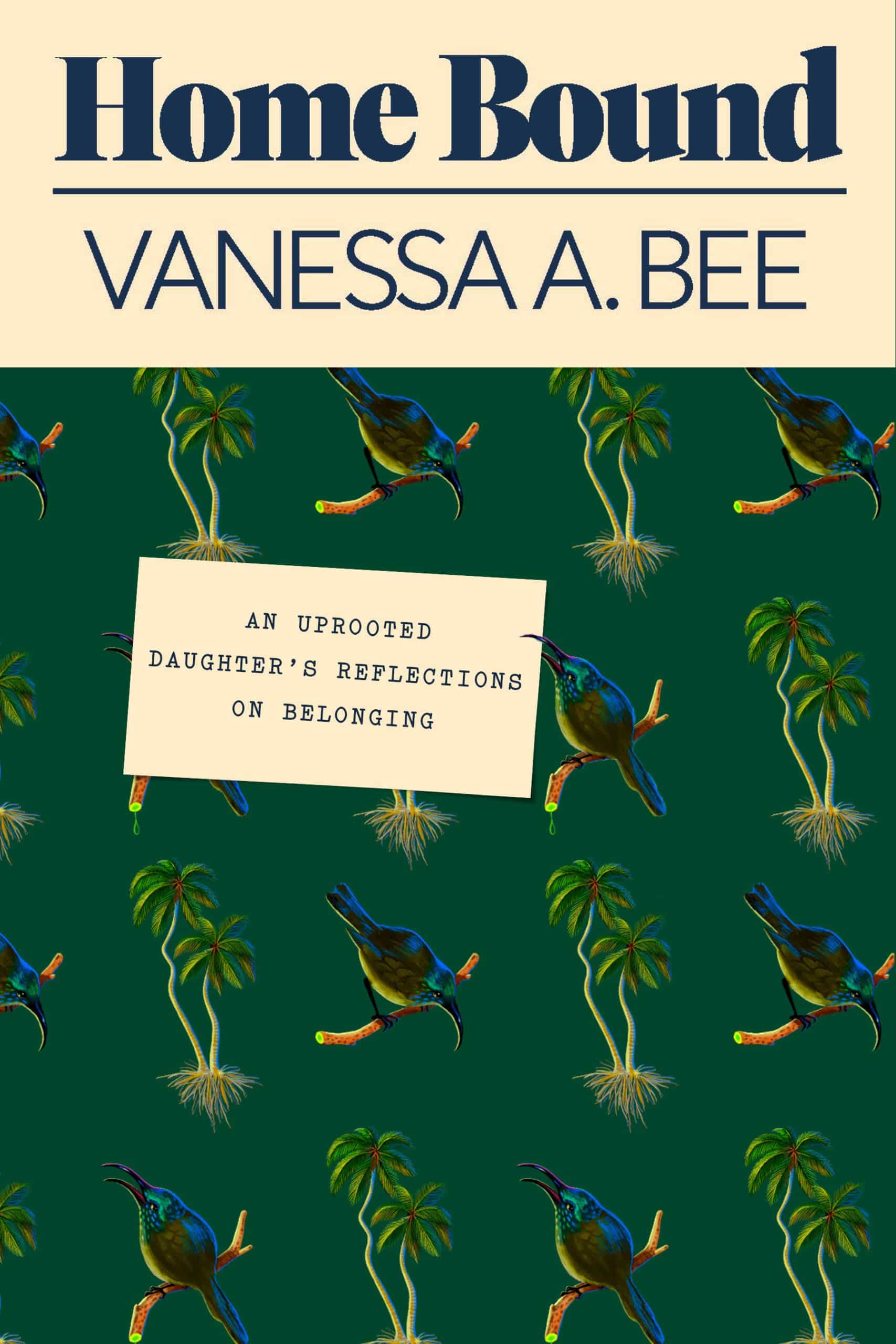No gift registry found click here to create new registry
Cart contain Gift Registry Items cannot add products
An Uprooted Daughter’s Reflections on Belonging: Home Bound
21.00 JOD
Please allow 2 – 5 weeks for delivery of this item
Add to Gift RegistryDescription
“This moving book is both an act of defiance — a way to construct a home outside of borders — and a timely manifesto on the need for more equitable housing policy in America, weaving her scholarship in economic justice together with her firsthand experience of the many places she’s lived. “Home Bound” is not just a resonant personal history, but also a thoroughly researched investigation of home.”—Rajpreet Heir, The New York Times Book Review”Readers of Home Bound will likely experience that pleasant rush of recognizing something personal in someone else’s reality, of answering, yes, home feels like this to me, too.” —Chicago Review of Books”Bee’s lyrical, emotive prose takes readers through her life with an intimacy that draws and keeps them close. . . . [Home Bound will] appeal to a variety of reader, challenging singular beliefs of what it means to be a daughter, sister, lover, wife, lawyer, and mother.” —Library Journal, starred reviewIn this singular and intimate memoir of identity and discovery, Vanessa A. Bee explores the way we define “home” and “belonging” — from her birth in Yaoundé, Cameroon, to her adoption by her aunt and her aunt’s white French husband, to experiencing housing insecurity in Europe and her eventual immigration to the US. After her parents’ divorce, Vanessa traveled with her mother to Lyon and later to London, eventually settling in Reno, Nevada, as a teenager, right around the financial crisis and the collapse of the housing market. At twenty, still a practicing evangelical Christian and newly married, Vanessa applied to and was accepted by Harvard Law School, where she was one of the youngest members of her class. There, she forged a new belief system, divorced her husband, left the church, and, inspired by her tumultuous childhood, pursued a career in economic justice upon graduation.Vanessa’s adoptive, multiracial, multilingual, multinational, and transcontinental upbringing has caused her to grapple for years with foundational questions such as: What is home? Is it the country we’re born in, the body we possess, or the name we were given and that identifies us? Is it the house we remember most fondly, the social status assigned to us, or the ideology we forge? What defines us and makes us uniquely who we are?Organized unconventionally around her own dictionary-style definitions of the word “home,” Vanessa tackles these timeless questions thematically and unpacks the many layers that contribute to and condition our understanding of ourselves and of our place in the world.
Additional information
| Weight | 0.45 kg |
|---|---|
| Dimensions | 2.29 × 16.03 × 23.65 cm |
| PubliCanadation City/Country | USA |
| Author(s) | |
| Format | |
| language1 | |
| Pages | 256 |
| Publisher | |
| Year Published | 2022-10-11 |
| Imprint | |
| ISBN 10 | 1662601336 |
| About The Author | Vanessa A. Bee is a consumer protection lawyer and essayist. Born in Cameroon, she grew up in France, England, and the United States. Vanessa holds an undergraduate degree from the University of Nevada and a law degree from Harvard. Her writing has appeared in among others, Current Affairs, The Nation, Guernica, and n+1 where she received a “Notable Essays” mention in the The Best American Essays 2022. She lives in Washington, DC. |
"This moving book is both an act of defiance — a way to construct a home outside of borders — and a timely manifesto on the need for more equitable housing policy in America, weaving her scholarship in economic justice together with her firsthand experience of the many places she’s lived. “Home Bound” is not just a resonant personal history, but also a thoroughly researched investigation of home."—Rajpreet Heir, The New York Times Book Review“[Bee’s] book interweaves this thread with more intimate explorations of her family lineages—but her insistence that a home is a right remains central. For Bee, a better world would be one in which everyone had not only adequate shelter, but the ability to shape their surroundings.”—Jewish Currents“A Harvard Law School graduate, she ultimately finds her own version of success and realizes that, no matter her given name or identity, she holds the power to rewrite her own definitions of home.”—Booklist"Readers will find a remarkable clarity of structure and mind with which she embarks on her attempt to peel back the layers of identity….. This is the story of an ambitious and bright young woman doing her best to navigate a complicated transcontinental existence, a real-life bildungsroman….Thoughtful yet decisive, this memoir transmits the authentic texture of a person making her way through a difficult world."—Andreea Iulia Scridon, The Ploughshares Blog "A meditative and captivating examination of the layers that make up a home… At times both wry and earnest, Bee’s memoir is a product of introspective scrutiny, reflecting both the deeply uncomfortable process of examining all the dark little corners of your life and the combination of maturity and self-respect it takes to tell your story with depth and nuance…. When Bee levels criticism at policies that create income inequality or questions how to forgive certain of her family members, she does so thoughtfully, fairly, and with unflinching honesty. And sometimes treating something fairly means recognizing when forgiveness cannot be on the table, at least for the moment." —Erika Dirk, Chicago Review of Books"This candid and compelling debut memoir examines identity, migration, status, tradition and family ties in intimate and evocative detail." —Karla J. Strand, Ms. Magazine"Interwoven throughout with Bee’s personal and multifaceted definitions of home, this richly tapestried memoir offers a unique perspective on identity as it restlessly probes the nature of belonging. An intimately incisive life story."—Kirkus Reviews"Fans of Bee’s writing know her as a gifted, astute essayist on matters political and personal for Current Affairs and other outlets, but she is also a lawyer who has lived around the world in many different settings. Her debut, a memoir, explores these journeys through space, class, circumstance from babyhood in Cameroon, to life with her adoptive family in France, to life with her mother in London and then Nevada during the housing crisis, to Harvard Law school and a break with young marriage and evangelical Christianity. I cannot wait to read this."—Lydia Kiesling, The Millions"What emerges is a rich and enthralling story of finding oneself outside of the bounds of borders and beliefs. This offers radiant hope in the face of darkness." —Publishers Weekly, starred review"Bee’s lyrical, emotive prose takes readers through her life with an intimacy that draws and keeps them close. . . . [Home Bound will] appeal to a variety of reader, challenging singular beliefs of what it means to be a daughter, sister, lover, wife, lawyer, and mother."—Library Journal, starred review“A hopeful, complicated, political, and, at times, devastating book. Vanessa resurrects stories from the deep crevices of her memory with ease, honesty, and a boundless capacity for empathy. Her preternatural talent for storytelling and her astute analysis have produced a book that manages to exceed the constraints of the memoir genre. I raced through the story, blown away by the depths of Vanessa's experience and her adeptness in recounting it. You have never read anything quite like Home Bound — a remarkable, captivating story that I've already begun recommending to everyone.”—Josie Duffy Rice, journalist, writer, and co-host of "What A Day"“A remarkable portrayal of daughterhood, Home Bound will reshape and expand your definition of belonging. In exquisite, captivating prose, Vanessa A. Bee charts her journey within a sprawling yet tight-knit family across three continents. She is a deeply empathetic writer who weaves intimate details alongside profound insights, and often moved me to tears. Moments after turning the last page, I started reading all over again—a rare impulse reserved only for my favorite books.” —Sanaë Lemoine, author of The Margot Affair "Home Bound is a mesmerizing, globe-spanning story of forgiveness, resilience, and love. Vanessa A. Bee writes with vulnerability, honesty, and fierce intelligence about the intricacies of home, identity, and belonging. A wise and gripping debut." —Rachel Khong, author of Goodbye, Vitamin "By turns deft, sensitive, witty, defiant, and always intellectually rigorous. Bee’s incisive explorations and bold declarations of who she is (and who she thinks she is), invites us to embrace and wrestle with the multitudes that we all contain."—Phuc Tran, author of Sigh, Gone |
|
| Table Of Content | Family Tree 1. Layers 2. Floating Feather Tree 3. The Dreaming is Free4. But by His Grace 5. Smells Like Team Spirit 6. Hello, Goodbye 7. The D Word 8. The Speculator 9. Don’t Know What You’ve Got til It’s… 10. Tonight, We Scream11. Of Iron and Soil12. Home Bound |
| Excerpt From Book | TONIGHT, WE SCREAM The workshop is called Self-Defense for Yogis. My neighborhood studio has offered it a few times since I arrived in Petworth but it takes me until November 2015 to sign up. I dread it from the moment I hit the purchase button. Taking the class feels like an admission of my inability to navigate the world without help, of how often I feel afraid when I step out of my apartment, of how tired I am of my own body.The men who have sexually harassed me have come in all stripes. Young, old, black, white, tall, short, rich, poor. Heterosexual and gay. Educated and not. They’ve been strangers, friends, and friends of friends.My outer layer has long been an invitation for men to smack their lips lewdly, grab my calves, pinch my hips, follow me home, call me names for lovers, and yell obscenities at me on the street. I’ve learned some things; others are unlearnable. Summer is worse than winter and spring worse than fall, but the nuisance is year-round. The amount of skin I expose is an unhelpful metric. My face could be masked up and cars would still slow down so men could crane their necks out of open windows. The unwanted attention does not make me feel beautiful, nor is it meant to. I realize that it isn’t about whether I’m pretty or about wooing me. My shell is an afterthought. A canvas for splattering insecurity and dissatisfaction.Exiting the interactions intact requires caution. At times, I project obliviousness convincingly—blessed be the headphones, for they shall deliver me elsewhere. When the men insist despite this soft rejection, I take the careful approach and give them an ear. It’s hard telling which of them are carrying knives. The pepper spray Dave sent me is buried somewhere in my apartment, unopened. It had been a kind gesture from him, but a part of me suspects that escalating these forced interactions with a chemical assault would not end well for me. I opt for a reserved smile and pray the men have somewhere else to be, so they can feel in control of ending our conversation. If we must keep talking, then the letdown must be gentle and always, always impersonal. These are fragile men.While the world conditioned me for public humiliation, it taught them that they deserved access to me. Or, at the very least, the pretense of access. And so the list of valid reasons to deny them excludes a lack of desire on my part. If I walk away, it must be due to an exhausting workday, or because I’ve mysteriously lost my command of English, or better yet, because I already belong to another—preferably cisgender—man. Nor am I permitted to seem afraid. I’ve been called a bitch enough times to appreciate that the pace at which I extract myself from these forced exchanges must be tolerable to the men.There are often plenty of eyes around. Sexual harassment has tainted each street I’ve ever strolled, every bus stop I’ve stood at, every campus I’ve crossed, every bar I’ve sat in, and every cab I’ve ridden in—regardless of whether I was the intended recipient. It’s happened in deserted alleys, but also in plain view, in places that should feel safe, if only for the sheer number of bodies around.Sometimes, I think people who have been on the receiving end must be better equipped to notice. Then again, having eyes isn’t the same as seeing. The people alongside me are eager to get home; they’re busy talking to lovers, instructing waitstaff, smoking cigarettes, waiting for the light to turn, reenacting that last work meeting in their heads.I never cease to be surprised by the number of my male friends, sensitive feminists, who believe street harassment exists, as any sensitive feminist would, but claim to have never seen it with their own eyes. I doubt they are lying to me. It’s easy to miss what’s in front of us without a reason to look. But to be routinely harassed in a sea of people, without so much as a blink, without anyone asking if I’m alright, if this man is bothering me, it makes me doubt my sanity. Did the exchange happen as I experienced it? Did it happen at all?Without eyewitnesses, only two records exist. The version of the harasser, long gone, but who would maintain the remark was innocent, a playful flirtation between adults—that is, if he were to admit to anything at all. Then there’s the harassed, who has only her recollection and her word to convince others, and perhaps herself. If she’s anything like me, fiercely protective of her reputation as a reliable narrator, she might sanitize emotion out of the facts. Loath to be called unfair, hysterical, an attention whore, or simply a whore, she downplays the magnitude of the incident—edits out details, expunges recurrences, omits names.I editorialize with gratuitous detail to elicit a smile from my audience. The man who sexually harassed me in a dark alley becomes the man who sexually harassed me at the crack of dawn, before either of us had caffeine; the man who sexually harassed me while hovering on one of those absurd motorized scooters; the man who sexually harassed me with bits of cheeseburger dribbling out of his mouth. If we’re all joking about it now, how bad could it have really been?On the rare occasions that the lewd comments are lobbed at me in front of my sensitive feminist friends, though, and they notice, none of us laughed. Rather, my friends react as many of us would upon seeing something we weren’t supposed to: look away, keep silent, hope it ends without disturbing our day. We speed away briskly and, until the next intersection, avoid eye contact with each other. A close friend of mine would later describe his embarrassment at witnessing my sexual harassment as not unlike “when someone starts masturbating on the subway.”I feel a perverted sense of vindication. For a brief moment, men had experienced the sidewalk as I did, seen it for the menacing, crass place it could be. The feeling passes, and when it does, I am left wondering whether my friends think any less of me for letting these strangers dress me down with their words. Do I think less of them for seeing misogyny in action and doing nothing? Did I want them to fight my battles—just this once?Was it even fair to expect? |
Only logged in customers who have purchased this product may leave a review.
Related products
-
On backorder 2-5 Weeks to Arrive
Add to Gift Registry18.99 JOD -
On backorder 2-5 Weeks to Arrive
Add to Gift Registry -
On backorder 2-5 Weeks to Arrive
Add to Gift Registry13.00 JOD -
On backorder 2-5 Weeks to Arrive
Add to Gift Registry13.00 JOD






Reviews
There are no reviews yet.